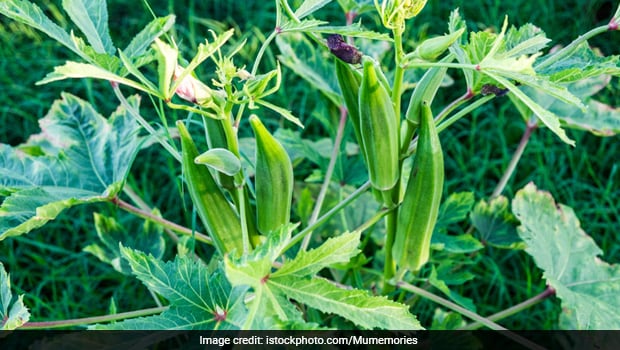Okra For Diabetes: Benefits, Uses And Expert Tips To Include Okra In Diet
Bhindi is probably one vegetable that is eaten across the country and globe. It is also called Okra or Lady Finger in English. Okra has been linked to lowering of blood sugars for several years. Okra has been used across Turkey, eastern Mediterranean civilizations for blood sugar control. Our very own Ayurvedic text has recommended and used okra in different ways for controlling blood sugars. Nutritionally, Okra is a very nourishing vegetable which is rich in vitamins, minerals and fiber. It is nutrients, very low in calories – only 30Kcals/ 100gms.
Diabetes is a metabolic disorder that cannot be cured, however good life style can help keep blood sugar under control. Other than a balanced diet, active lifestyle, and good rest, there are certain foods and spices that have been found to help control blood sugar and protect other organs against the damage. Okra is one such vegetable.
Okra pods and seeds have been used as an infusion for controlling blood sugars. They are dried to make a powder and then incorporated in the diet. A number of lab studies and animal studies have shown a positive effect of okra in controlling raised blood sugar levels.
(Also Read: 5 Desi Indian Snacks You’ll Love To Have On Diabetes Diet)

Okra For Diabetics: Benefits Of Okra For Blood Sugar Control
Okra is a rich source of both soluble and insoluble fibers which are very effective in controlling blood sugars. They slow down the absorption of carbohydrates from a meal, delaying the digestion which prevents post meal spikes and hunger pangs.
Okra is very rich in flavonoids or antioxidants. These compounds have been found to actively work on sugar control. The most common compound is Myricetin – which not only helps lower sugar levels but is also preventive against other non-communicable diseases like cancer, cardiac diseases, and cholesterol. Okra also has another three compounds that have a positive effect on sugar control, namely, Oleanolic acid, Beta Sistostenol, Myricetin, and Kaempferol.
Okra was also found to contain a complex carbohydrate, ‘rhamnogalacturonan’, which was identified for its positive effect on controlling blood sugars.
(Also Read: Make This Magical Vegetable Juice For Your Diabetes Diet)

Okra or Bhindi can be used in a number of ways for the Diabetes diet.
How To Use Okra For Diabetes Diet
The entire okra pod has been used for controlling blood sugars. Studies have found that consuming Okra thrice a week has a positive effect.
Okra can be dried powdered and used.
Okra water is another way of consuming it. Today, okra water is assuming the status of a super drink. It has been used traditionally, but with recent scientific studies supporting the health benefits , it is fast becoming popular.
How To Make Okra Water
Take 3-5 Okra pods. Cut off the head and tail and make a slit from top to bottom
Soak these in 2 glasses of water over night
In the morning mash or squeeze these soaked pods so that the entire slime is mixed in water.
Your Okra water is ready.
(Also Read: Diabetes Diet: This Okra Soup May Be A Healthy Addition To Your Diet)

Okra water can be prepared at home with these simple steps.
The best time recommended to have this is early morning on an empty stomach. It is found to be the most effective and safe when had like this.
Precautions must be taken if you are allergic to Okra or find that after consuming the drink you are not comfortable. People with IBS must avoid okra water as it is a rich source of Fructan which might aggravate your symptoms. You may try eating the vegetable cooked as normal rather than a concentrated raw Okra water.
Point To Note:
Okra is a freely available vegetable and is good for diabetes control, but having it in excess will not mean more health. In fact, excluding other vegetables in rotation would more detrimental to overall health. Another thing is that we all love fried, crisp okra- this has to be avoided, especially if you are a diabetic. Cook it with limited oil and if you like it crisp, cut and dry it in the sun for the same texture as frying. Air fryer will also produce the same texture.
(Also Read: Bhindi May Help Manage Diabetes, 5 Fun Ways To Include Bhindi In Your Diet)

To make Kurkuri Bhindi or Okra, use an air fryer for an easy, low-oil option.
To conclude, I would suggest that start with one day, see how you react to it. Also check with your doctor if you are on diabetic drug therapy and then build up gradually.
Stay safe, stay healthy, stay at home!
Disclaimer: The opinions expressed within this article are the personal opinions of the author. NDTV is not responsible for the accuracy, completeness, suitability, or validity of any information on this article. All information is provided on an as-is basis. The information, facts or opinions appearing in the article do not reflect the views of NDTV and NDTV does not assume any responsibility or liability for the same.
For all the latest Health News Click Here
For the latest news and updates, follow us on Google News.
